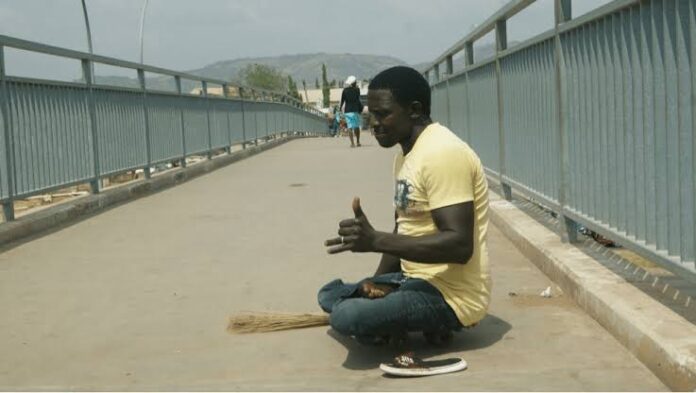By Okwe Obi
Majority of the pedestrian bridges and walkways in the Federal Capital Territory (FCT) Abuja, have been taken over by street beggars mostly those with special needs. The bridges in Nyanya, Areas 1, 3 up to Banex and Nicon Junction are now under the care of people who are at the mercy of the society.
These fellows are very punctual to their “duty post.
”As early as 7am, family members and friends drop them off. Despite their pitiable state, they start the day by crawling and sweeping the environment.
Their actions attract both sympathy and scorn from passers-by.
Some see them as nuisance and “busy bodies” who block the way of passage and raise dust in the name of tidying the road. While those with of kindness throw money at them as morale booster.
The morning function sometimes takes two hours to complete because of the in flocks of people and dedication in ensuring that the bridges sparkle.
Although, the Social Development Secretariat (SDS) of the Federal Capital Territory Administration of frown at their modus operandi and in 2021, arrested 217 street beggars, who stay on pedestrian bridges.
Its acting Director, Sani Rabe, declared zero tolerance for destitute, child abuse, street begging and all forms of activities that constitute environmental nuisance.
He spoke when he led an enforcement team and evacuation squad to arrest beggars and destitute accusing them of defacing the city: “We arrested many beggars with substantial amount of money with them. Some of them are sick, malnourished and don’t even take care of themselves as they leave in a very dirty environment.
“We have on record at the FCT Bwari Area Council Rehabilitation Centre, where we use to organise rehabilitation and vocational training for beggars and destitute.
” He vowed that the FCTA would continue to arrest beggars to make them understand that begging does not help an individual.
Daily Sun spoke with some of them. Musa Ibrahim, an indigene of Dauda, Katsina State, father of two, delights in keeping Area 3 pedestrian walkway neat: “Area 3 is my regular spot. We are two that clean this place. Before we started tidying up this place, it used to be very dirty and smelly.
People excrete under the bridge mostly at night. Since we took possession of the place things have changed. “I cannot walk. So, staying in a strategic place to beg is all I do for a living. We are use to the harsh weather. Some people who are moved by our plights do assist us. Others just pass without helping. The most important thing is that we are alive. “There is actually no fix amount of money I get. It all depends on the people. Some days I go home with N800. Other days, I get N1,250. I use it to feed and take care of my brother that brings me here everyday.
”Adamu Abdul, a shoe cobbler, was spotted on the bridge connecting Banex to Kado axis: “I was one of the victims of the 2014 Nyanya bomb blast (of April 14, 2014). That incident left me incapacitated. Assistance from family and friends weaned. So, I had no option than to help myself. “The Banex-Kado Bridge is a busy place. But I have to adjust to the situation to help myself. I wake up as early as 6am from Mararaba just to beat the traffic. “I get to Banex between 7:45 and 8am with the help of my neighbour. The first thing I do is to clean the area. Most times before I get there, the place is crowded with commuters.“Regardless, I just have to do my bit. Most people appreciate others do not. In fact, they see us as nuisance. If we are lucky, we get something substantial for the day like N1,000 to N2,000. Some days, we get as low as N450. ”How he copes with the FCTA personnel: “We are use to their harassment. They come with sticks and stones as if they are coming to kill. But when they see us cleaning the walkways, they go soft.
“But the overzealous ones would want to harass and arrest us. It takes the help of passers-by to rescue us. It has not been easy.
”Person with physical disability and mother of two, Aisha, lamented: “My situation is as a result of polio. When the fighting in Borno State became unbearable, I decided to run away with my two kids in search of daily bread. “The first port of call is the Nyanya Bridge. I sleep there with my two daughters, if need be. But most times we run to Tundu Wada, a suburb in Mararaba to cool off. We survive on the magnanimity of kind-hearted Nigerians.”


